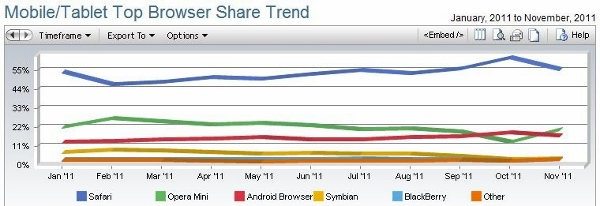Safari browser usage suddenly tumbles

Microsoft shouldn't break out the champagne just yet, but there's still reason to celebrate even if no trend is yet evident. Internet Explorer usage share nudged up ever so slightly in November, according to new data Network Applications released today. Meanwhile, Chrome kept its relentless march upward -- for the 13th consecutive month. Firefox is still No. 2, contrary to reports today from StatCounter. I trust NetApps data more.
Safari was by far the month's biggest loser, with usage share falling to 5 percent from 5.43 percent in October. The loss is no small matter. Safari is integral to Apple's broader digital lifestyle push, where synchronization is vital component -- and that includes Safari. Related: Apple shipped record number of Macs during third calendar quarter, launched iPhone 4S and iCloud and saw global PC share top 5 percent. By that reckoning, Safari share should be up, not down.
Mobile is perhaps the Webkit-based browser's redemption, however, or so it seems at first glance. There, Safari share is 55.03 percent, followed by Opera (20.09 percent) and Android's browser (16.36). But there's downward trend, and it's much more pronounced. Mobile Safari usage share fell from 62.03 percent, while Opera surged from 13.09 percent. That said, mobile stats are fairly inconsistent month-to-month, unlike those for desktop browsers.
There, Safari usage share consistently rose -- from 4.15 percent in January until November's sudden drop. Is this start of a new trend? Here's something to consider: Chrome, Firefox and Opera are all on fast-development tracks -- typically six weeks between major milestones. Safari is not. If anything, Safari development looks more like Internet Explorer 6 in the early Noughties. New development and introduction of new features moves at a snail's pace compared to competing browsers.
That's not surprising considering Apple's priority is nurturing its apps ecosystem from separate iOS and Mac OS X stores. Browser isn't as high priority. Something else to consider: Apple disdains Adobe Flash, which is no longer installed by default and isn't available at all on mobile. Perhaps the market sees Flash as necessary after all.
Safari's pain is Internet Explorer's gain, if ever so slightly. IE usage share was 52.64 percent in November, up .01 percent a month earlier. That's still down from two years ago, when IE usage share was 60.35 percent. Meanwhile Chrome continues its relentless gains, which are slowing. Chrome share was 18.18 percent in November, up from 17.62 a month earlier and 9.5 percent in November 2010.
Microsoft's newest shipping browser simply cannot keep pace. IE9 usage share is a meager 10.25 percent, well behind Chrome 15 (14.58 percent) and IE8 (28.2 percent). However, IE9 is on steady upward trajectory, moving up from 1.08 percent share in March.
Firefox usage share fell for the fifth consecutive month -- to 22.14 percent share from 22.52 in October. Competing data from StatCounter puts Chrome ahead of Firefox. I'm predisposed to NetApps data, so I'm calling it Firefox second place and still solid over Chrome.
But I'll add this: If not for Mozilla ramping up development cycles to match Google's, I'm convinced Chrome would have passed Firefox months ago. That said, rapid development, which also means half dozen or so new browser versions a year and fast retirement of older ones, holds back adoption for both browsers. Many larger businesses can't test and deploy current Chrome and Firefox versions before they're outdated. Internet Explorer and Safari are more stable options, from that perspective.
As for Safari, only another couple months of data will reveal whether November was a hiccup or beginning of trouble.